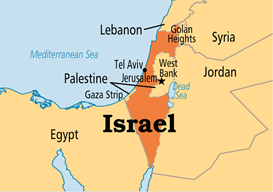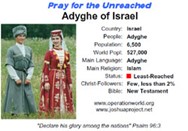TODAY’S READING FROM THE OLD TESTAMENT- 2 CHRONICLES 1:13:17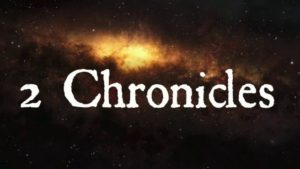
Today we get started on the Book of Second Chronicles.
2 Chronicles is a continuation of the history of the Kings of Israel, focusing on the southern kingdom of Judah. There is an emphasis on the spiritual history of David’s descendants. From the perspective of the priesthood, we see the nation’s history in relationship to God and the temple.
In the first chapter, we see how Solomon came into full possession of the kingdom. God was with him and established his rule by the gracious promise given to his father, David.
Although the ark was now in Jerusalem, housed in a temporary tent which David prepared for it, the Tabernacle of Moses and the original brazen altar fashioned by Bezalel was still at the high place in Gibeon. Solomon had it on his heart to begin his reign by calling his people to worship the Lord and to bring sacrifices of thanksgiving before Him.
In this case, God was not bound to the strict letter of the law and received the worship of Solomon and his people, although the ark was not present. The phrase is significant: “The assembly sought out the bronze altar.” It reminds us of the place of the Ultimate Sacrifice where our sins were atoned for. As worshipers, may we never forget the cross and continue to seek it out for a fresh appreciation of God’s great love and mercy.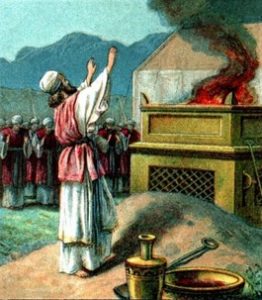
2 Chronicles 1:5 5 Now the bronze altar, which Bezalel the son of Uri, the son of Hur, had made, was there before the tabernacle of the LORD, and Solomon and the assembly sought it out.
They went to Gibeon because “God’s tent of meeting was there,” or as the ESV reads, “the tent of meeting of God” was there (2 Chronicles 1:3). The idea is that the main purpose was not that the tabernacle was a place for people to meet with each other, but where the people were to come for a ‘meeting of God.’ The tabernacle was not to be a mere meeting house. The meeting would be of God, with God, and for God.
Is this how you see our gatherings with brothers and sisters for worship? Of course, there is great joy in sharing our experience of God together, but we want to be sure that He is the central focus and not ourselves.
Solomon offered 1,000 burnt offerings on the brazen altar. His heart was stirred with gratitude for the mercy that God had shown him. He knew that by God’s grace, he had been set apart, set upon the throne of his father David and that he was experiencing God’s promise to exalt him greatly.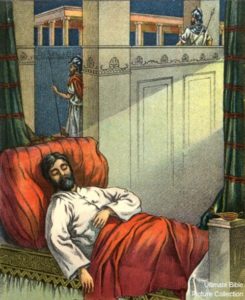
So when later that night God appeared to Solomon in a dream and told him to make a request (1 Kings 3:5; 2 Chronicles 1:7), Solomon did not ask for wisdom in order to become great and wealthy. His request was made in the light of the great grace shown to Him by God. God was entrusting the leadership of the nation to him.
The humility of Solomon’s request is made clearer in 1 Kings 3:6-9.
1 Kings 3:6-9 6 Then Solomon said, “You have shown great lovingkindness to Your servant David my father, according as he walked before You in truth and righteousness and uprightness of heart toward You; and You have reserved for him this great lovingkindness, that You have given him a son to sit on his throne, as it is this day. 7 “Now, O LORD my God, You have made Your servant king in place of my father David, yet I am but a little child; I do not know how to go out or come in. 8 “Your servant is in the midst of Your people which You have chosen, a great people who are too many to be numbered or counted. 9 “So give Your servant an understanding heart to judge Your people to discern between good and evil. For who is able to judge this great people of Yours?”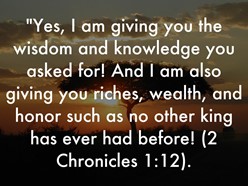
2 Chronicles puts it this way:
2 Chronicles 1:10 10 “Give me now wisdom and knowledge, that I may go out and come in before this people, for who can rule this great people of Yours?”
The Lord not only grants Solomon’s request for wisdom and knowledge to govern God’s people but promises him riches, possessions, and honor. Some of these riches are described in 2 Chronicles 1:14-17. The success of Solomon’s economic savvy is indicated by the statement, “And the king made silver and gold as common in Jerusalem as stone”! (2 Chronicles 1:15)
Solomon receives wisdom to govern, but he demonstrates a lack of godly wisdom in his personal life. There are some things he sees clearly and walks in obedience to the revealed will of God. There are other areas in which his own lust and greed deceive him. The areas of neglect, as in his father’s life, begin in his personal life, but have widespread consequences in the life and downfall of the nation.
His personal ambition gets the best of him, and he multiplies horses and wives. He is inebriated with his wealth and power, but these shadows in his character are not the focus of the chronicler and are largely overlooked. He chronicles the elusive nature of satisfaction with his life in The Book of Ecclesiastes.
Chronicles, however, as we have seen, focuses more on the elements of the reign of Judah’s kings that are more suited as prototypes for the coming Messiah, the greater Solomon, Jesus, the Christ.
Solomon recognizes the nature of his task is to glorify God. The temple he is to build is not a building that can contain God’s presence, although he expected His presence to be manifested there. In his letter to King Hiram, the king of Tyre, he makes his intentions clear. The temple he was to build would be a place only to burn incense before Him and offer the prescribed sacrifices that would speak of Christ (2 Chronicles 2:4).
2 Chronicles 2:5 5 “The house which I am about to build will be great, for greater is our God than all the gods.
As God’s habitation, His spiritual house (Ephesians 2:21-22), and His appointed royal priesthood, we are today to offer the spiritual incense and sacrifices of praise, adoration, and worship to God (1 Peter 2:4-5).
John 4:24 24 “God is spirit, and those who worship Him must worship in spirit and truth.”
Hiram answers Solomon’s request for choice supplies and skilled craftsmen. He sends an exceptionally skilled artisan named Huramabi. This imported talent was a gift from God. Thank God for imported talent that comes just at the right time to meet the need.
Huramabi was “the son of a Danite woman and a Tyrian father, who knows how to work in gold, silver, bronze, iron, stone and wood, and in purple, violet, linen and crimson fabrics, and who knows how to make all kinds of engravings and to execute any design which may be assigned to him.” He was also a good team player knowing how to work with other artists and successfully oversee them.
Solomon exercised wisdom in border control and kept track of the foreigners that had come to take up residence in Jerusalem for the construction project. He made sure that their physical and material needs were met.
Verse 1 of Chapter 3 ties together the stories of Abraham, David, and Solomon. The temple is going to be built on Mount Moriah, meaning ‘seen of God’, or paraphrased, ‘center stage.’ The only other place in the Bible where this name appears is in Genesis 22:2 when father Abraham is told to take his only son, Isaac, and offer him there to God. The angel of the Lord appears and stays Abraham’s hand and tells him that God would provide a substitute. The promise of God providing Himself as a substitute upon Mount Moriah was preserved through the name given by Abraham “Yahweh Jireh,” The Lord He will provide.” Centuries later, the Lord appeared there to David. David made sacrifices on the threshing floor of Ornan (Araunah), the Jebusite (2 Samuel 24), to turn away God’s wrathful judgment of sin. On this same piece of real estate, Solomon was now beginning to construct the temple planned and supplied for by his father in the second day of the second month of the fourth year of his reign.
The accurate dimensions of the temple’s foundations are described. So are the details of the materials and ornamentations. According to the Teacher’s Commentary, “The gold used in its construction was worth over 2.5 billion dollars—if gold were valued at only the old $35 per ounce. And 10 times as much silver as gold had been gathered by David before construction began.”
The dimensions of the temple and the Holy of Holies are doubled to the original dimensions given by Moses for the Tabernacle. Everything is greater, because the temple is pointing to the greater reality, the greater Son of David, the promise of Abraham, who will provide Himself as the sinless substitute there on Mount Moriah- the perfect sacrifice that would forever turn away God’s wrath against our sin and turn the judgment seat into a mercy seat for the penitent believer.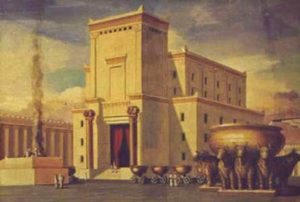
In front of the temple were two free-standing pillars, 6 feet thick, standing 35 cubits high (27 feet). The one on the right is named Jachin (‘He establishes’), and the one on the left, Boaz ‘(In Him is strength’). The pillars symbolized that God had established His house and would fulfill its work in His strength.
The pillars were topped with flaming light at night to symbolize the mountaintop presence of the Lord.
TODAY’S READING FROM THE NEW TESTAMENT – ROMANS 6:1-23; PSALM 16:1-11
In Romans 1 and 2, we learned of the universal problem of sin. In Chapters 3-5, we were introduced to God’s solution in Christ- how sinners are justified in the sight of a holy God through faith in Christ and His perfect atoning sacrifice on the cross. But Jesus did not just come to save us from the penalty of sin (justification), but also the power of sin (sanctification) and, one day, the presence of sin (glorification). The reading in Romans today shows us how we can be free from the power of sin through reckoning on our faith-union with Christ and relying on the power of the Holy Spirit. We are not only saved by Jesus’ death on the cross, but on the basis of the cross, we become partakers of Jesus’ resurrection life.
Whereas Romans 4 through 5 walks us through the means of forgiveness- the shed blood of Jesus, Romans 6 through 8 walks us through the means of deliverance- the indwelling life of Christ through the Holy Spirit. Chapters 4 and 5 remind us of the value of the blood, symbolizing the poured-out life of Christ for an atonement for sin in order to justify us. Chapters 6 through 8 focus on the work of the cross to deliver us from the power of sin. The Holy Spirit makes real to us our co-crucifixion, co-burial (baptism), co-resurrection, and co-ascension as those who are identified (hid) with Christ.
Paul imagines someone who might misinterpret God’s gift of forgiveness as a license to live lawlessly. “If God lovingly and freely forgives sin, why not give him more to forgive?” Perhaps someone might think, “If forgiveness is secured by the performance of Christ as our Substitute alone, don’t we now have the freedom to sin as much as we want?”
Paul emphatically replies, “May it never be!” That is not salvation. Jesus did not come to leave you a slave to sin! He came not only to provide forgiveness of sins but deliverance from the power of sin. He took the penalty of our sins, but he also takes us, the sinner, to the cross, to render the power of sin useless through our co-crucifixion, co-burial, co-resurrection, co-ascension which is made real to us through the work of the Holy Spirit.
As believers, we are called to embrace our union with Christ by faith.
- We died with Him (Romans 6:2-3).
- We were buried with Him (Romans 6:4a).
- We are raised with Him (Romans 6:4b).
- We are alive with Him in the power of resurrection and thereby free from the domination of sin (Romans 6:5-6).
Romans 6:6 6 knowing this, that our old self was crucified (past tense) with Him, in order that our body of sin might be done away with (katargeo- lit. rendered inoperative; ESV ‘brought to nothing’), so that we would no longer be slaves to sin;
- The Result- Deliverance; With the penalty for sin paid for, the provision for holy living is provided. In Christ, we die to the demands of sin and death. We have a sin nature, but that sin nature does not have us. We can fellowship with the Holy Spirit who activates in us the law of the Spirit of life in Christ Jesus.
This spiritual knowledge (Points 1 through 5) needs to be reckoned upon daily.
Romans 6:11 11 Likewise you also, reckon yourselves to be dead indeed to sin, but alive to God in Christ Jesus our Lord.
The word ‘reckon’ is an accounting term. What you decide to do with your money requires that you reckon how much money you have available in the bank. You reckon with the facts.
As Christians, we continually reckon with the facts of our history. We have been crucified with Christ. We are dead to sin, and therefore we are not available to serve the sin-loving desires of our old nature. We are no longer under the law because we are joined in a faith union with Christ who fulfilled the Law for us and is alive to fulfill the Law in us by the Spirit.
In Christ, we yield our bodies to righteousness. Sin is not our master. Christ is. He is “the Lord our righteousness” (Jeremiah 23:6; 33:16). He, the Law-giver, has become the Law-keeper in our hearts. And He is able to bring forth the fruit of holy living through us.
Romans 6:23 23 For the wages of sin is death, but the gift of God is eternal life in Christ Jesus our Lord.
Our sins earned us eternal separation from God. Jesus not only satisfied God’s justice by taking sin’s penalty by dying as our substitute on the cross, His perfect obedience as our substitute earned eternal life which is freely gifted to us to be received by faith.
TODAY’S READING FROM THE BOOK OF PSALMS- PSALM 16:1-11
Psalm 16 contains a powerful prophecy of the resurrection of Jesus Christ.
It is called ‘a mitkam’, and the first of six psalms to be given that distinction. The other five ‘mitkams’ are Psalms 56- 60. What is a ‘mitkam’? Some believe it to mean a personal or private prayer or meditation’. Other scholars believe it may be a musical or liturgical term.
This Psalm is ‘a mitkam of David’. We don’t know when it was written or the specific situation of danger that David was facing, but under the inspiration of the Holy Spirit, it is distinctly Messianic.
In the New Testament, the Apostles Peter and Paul will quote this Psalm and prove that it was Jesus and not David who fits its description (Acts 2:25-31; 13:34-37).
The first verse is a prayer request:
Psalm 16:1 1 Preserve me, O God, for in You I put my trust.
The rest of the Psalm describes why David puts his trust in the Lord.
The Lord is the only source of goodness. Yet that goodness is to one day be reflected in the saints who are upon the earth. They are made in God’s image, and in Christ, they will one day reflect that image with excellence (v.3-4).
The Sovereign Lord has authored the singer’s inheritance, his lot, and cup. There is satisfaction rather than sorrow when a person gives their full worship to Him.
The Lord is his counselor and teacher. David is benefitted by His instruction with both day and night classes (v.7).
David’s personal resolve is to set the Lord always before Him, for He is the source of David’s security, and to do his will was the delight of his heart.
Where is your joy today? Are your eyes fixed on the reality of Christ’s supremacy?
Who is this one who has such pure devotion? Verses 10 and 11 single out one man from the entire span of human history. It is the Holy One. There is only one who lived a perfect life of righteousness. God the Father bore witness to this fact by not allowing him to suffer corruption after his death but raised Him by His power and declared Him to be heir of all things, both Lord and Christ, the Son of God.
Psalm 16:10-11 10 For You will not leave my soul in Sheol, nor will You allow Your Holy One to see corruption. 11 You will show me the path of life; In Your presence is fullness of joy; At Your right hand are pleasures forevermore.
The perfect life and work of Jesus has secured fullness of joy in His presence and lasting pleasures for the saints who believe in Him
TODAY’S READING FROM THE BOOK OF PROVERBS- PROVERBS 19:20-21
Proverbs 19:20-21 20 Listen to counsel and accept discipline, that you may be wise the rest of your days. 21 Many plans are in a man’s heart, but the counsel of the LORD will stand.
God gave us a mind to make wise decisions and plans. Yet, we are extremely vulnerable in doing so unless we are receptive to His counsel and discipline. Our plans may not come to pass according to our design, but the purposes of the Lord will not be thwarted, and the counsel of the Lord will ultimately be proved true.
Israel
State of Israel
Asia
Geography
Area: 20,700 sq. km
A further 7,540 sq. km of the West Bank, Gaza and the Golan Heights have been controlled by Israel since 1967.
Population: 7,285,033 Annual Growth: 1.71%
Capital: Jerusalem
Urbanites: 91.7%
HDI Rank: 27 of 182 (UN Human Development Reports 2009)
Peoples: 53 (75% unreached) All peoples
Unreached Peoples Prayer Card
Official language: Hebrew, Arabic. Numerous immigrant languages from all over the world are spoken Languages: 48 All languages
Religion
Largest Religion: Jewish
|
Religion |
|
Pop % |
Ann Gr |
|
148,615 |
2.04 |
0.5 |
|
|
31,045 |
0.4 |
5.6 |
|
|
Jewish |
5,492,915 |
75.40 |
|
Challenges for Prayer
Followers of Jesus in Israel are likewise a mix of Messianic Jews, foreign believers, and Arab-Israeli Christians. All three groups have grown recently – especially Messianic and expatriate believers – the result of both immigration and conversion. There are over 120 Hebrew-speaking gatherings. Russian-speaking congregations are the next-largest number (as many as 50), followed by eight Amharic-speaking (Ethiopian) congregations and a smattering of fellowships in various European languages. Israeli-born Messianic Jews are around 1,000. Pray for:
a) Boldness in witness and perseverance of faith despite difficulties and opposition. The Haredi regard evangelicals as subversive and a threat to Judaism and therefore malign and occasionally harass them. Tolerance of Christians and Messianic Jews is high, but proselytism is increasingly opposed, especially by the ultra-Orthodox.
b) Full legal rights of immigration and social acceptance in the face of national, social and family pressures. Israeli law states that national identity and religious identity of Jews are one; secular Jews can become citizens, but Christian Jews cannot.
c) Clarity of teaching and understanding about their Jewishness– there needs to be a cultural identity without compromising New Testament truth. There are now Bible training colleges in Tel Aviv, Jerusalem, Haifa and Nazareth for the formation of capable leaders.
d) Arab evangelicals are more numerous in Protestant and Independent denominations – but total fewer than 4,000. Of these, only a few dozen are Muslim-background believers. The number of those coming to faith is growing at an encouraging rate, but they emigrate to the West just as rapidly.
Unity between Messianic Jews and Arab Christians. A quiet revolution in relationships between Jewish and Arab believers is beginning in the Holy Land. The recently formed Convention of Evangelical Churches in Israel (and an equivalent organization in the Palestinian Authority) is a major step forward. Jewish and Arab believers cooperate in ministry through the National Evangelism Committee. Their joint outreach efforts into Muslim areas are well received. Many other grassroots initiatives, often unreported, see these two groups of believers from very different backgrounds blazing a trail of reconciliation and friendship that is an example to the rest of the region. But some others question or are even opposed to such developments. Pray that there might be grace among all who call upon Jesus/Yeshua/Isa to love, support, and bear with one another.
PRAYER: Lord, You are the source of all wisdom and goodness. You saw our greatest need and, in Your wisdom, gave us the perfect solution in Christ Jesus. You have made Him to be for us our wisdom, the provided answer for our deepest needs, our need for righteousness, sanctification, and redemption. He is the cleft of the Rock in which we find refuge from our deserved judgment and through whom we have free and safe access into Your presence. Lord Jesus, thank You for willingly identifying with us and taking the penalty of our sin, that we might be mercifully justified in the court of Your impeccable justice. We thank You for Your faithfulness to publicly vindicate His testimony by raising Him from the dead that we might share in His inheritance of fullness of joy and everlasting pleasure in Your presence! Give us the wisdom to walk in a way that honors Your holy Name through Christ Jesus our Lord. Amen.

